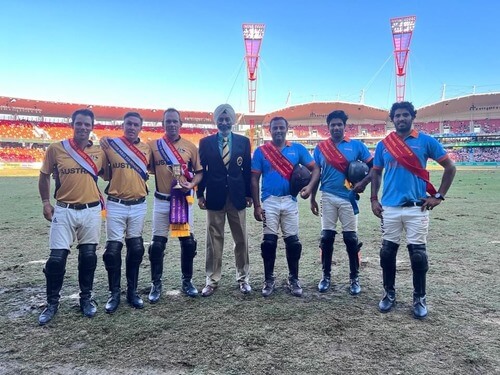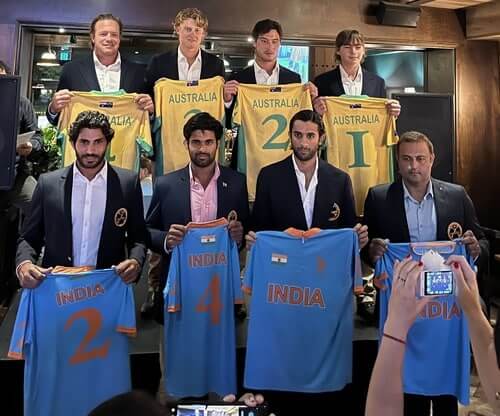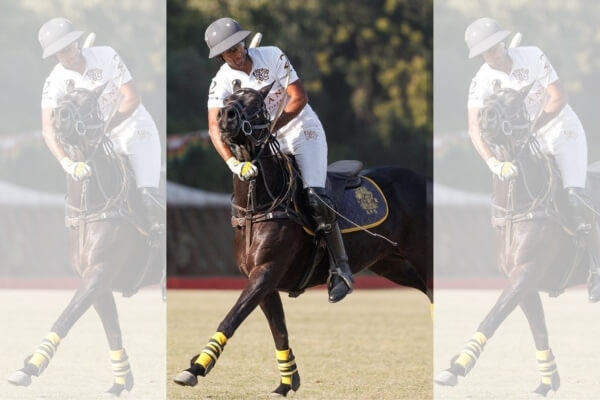And so the anticipated adrenaline-fueled India and Australia polo match at Windsor never transpired.
More than 100mm of rainfall and the continued risk of further flooding in the region forced the hand of the organisers to make the difficult decision to cancel the international event twenty-four hours before the first chukka was to be played.
The players themselves had to be evacuated from the region before dawn, as rising water levels began to cut off road access.
The horses that were to be loaned to Team India for the match were either transported back to the safety of their stables or taken to higher ground.
However, not all was in vain. Jeremy Bayard, a director at NSW Polo Association told Indian Link, “The tour by the Indian team has cemented the relations between the Australian Polo Federation and Indian Polo Association. We are confident that within the next year or two, the Indian team will be back, and discussions are on-foot to ensure that the clash between the two countries will occur biennially.”

He added, “The team endeared themselves to the Australian Polo community in the most spectacular way. They were the most gracious, entertaining and friendly group of people that anyone could ever hope for.”
The high praises for Team India was echoed “across the length of the country – especially given that under the trying circumstances the Indian team took everything thrown at them,” he said.
Those of us who were fortunate to meet Team India in the week prior to the cancelled match would undoubtedly agree with comments from Bayard, that the team had a positive impact on the Polo-playing and non-playing members of the Indian community.
From the very first interaction with Siddhant “Sid” Sharma and Naveen “Noddy” Singh, who shared their passion for the sport, the love for the horses, and pride in playing for India, to Syed Shamsheer Ali, captain of the Indian team, it was clear that India’s most talented horsemen were also the best-suited ambassadors for the sport and their country.
Shamsheer “Chamma” Ali shared stories of his Polo-playing journey with a very calming and encouraging demeanour. “My dad, himself a lover of polo, put me on a horse when I was eight,” he described. “A year later, he had introduced me to polo.”
He has not looked back since. Now 42, and known as ‘The Man with the Golden Hand’ for his exceptional skills, he has been playing professionally for just over twenty years. It is a career that has seen him play across the globe, including a five-year stint in Argentina.

Even from the brief interactions with H.H Maharaja Sawai Padmanabh Singh of Jaipur, it was clear that he was happy to have a candid conversation about his experience as a Polo player, interests in culture and heritage, and even after a cheeky quip that his highness had brought the rain with him having only joined the Indian team camp a day prior to the deluge on Friday — he recounted his time at school in England and his dislike for the wet weather.
The Indian coach Col. Navjit Singh Sandhu welcomed the suggestion that India v Australia could become a regular fixture. “This would cement the sporting rivalry between the two countries beyond the likes of Cricket and Hockey,” he observed. “This would be yet another example of the unique power of sports diplomacy – bringing people and communities closer together through a shared love of a physical pursuit.”
Many newcomers to the sport of Polo may look on and see a player on top of a horse that is doing all the hard work, but ask any person who has ridden, let alone played a chukka (or six), and they know the strain that the sport puts on the body. And while the off-field proclivities at a Polo match suggest a balanced fine dining experience, the sport is very much a contact sport for those competing.
Picture riding on horseback, controlling your horse with one hand while using only your right hand to swing a thin, bamboo stick with not much more than a cigar’s width of wood at the end, aiming at a ball the size of a cricket ball that could be bouncing waywardly across grass cut up by rampaging hooves—cue opponent—who at the same time is trying to ram you out of the way by charging at you shoulder to shoulder.

All this and more were what polo enthusiasts and newcomers were hoping to witness on Sunday, 7 April 2024, in the now cancelled India and Australia polo match.
However, it is important to recognise that Polo is an expensive sport due to the number of horses needed to play and all the associated costs of breeding or buying, looking after, training, and keeping them fit. Patrons are undoubtedly an important aspect of the sport, and their financial support is necessary. Whether veterans of the sport or newcomers—players or spectators—there is a unique opportunity to elevate the sport of Polo between two closely linked countries, with a healthy sporting rivalry. If the lead-up to the weekend is anything to go by, the players, the horse lenders, and more importantly, the spectators are ready.
In the meantime, our thoughts are with the Polo and wider Hawkesbury community as they attend to the flood conditions in the region. We hope this unfortunate setback will strengthen the Australian and NSW Polo communities’ resolve to re-invite the Indian Polo team back for an India and Australia polo match in the not-so-distant future.
If this weekend’s cancelled India and Australia polo match is to be treated as the inaugural biennial fixture—the result will be marked as DNP. Looking forward to hopefully seeing Team India play at the Windsor Polo Club no later than 2026.
READ MORE: India take on Australia at Windsor NSW





